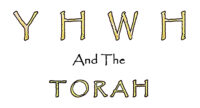1 And 𐤉𐤄𐤅𐤄 spoke to Mosheh and to Aharon, saying,
2 “This is a law of the Torah which 𐤉𐤄𐤅𐤄 has commanded, saying, ‘Speak to the children of Yisra’ĕl, that they bring you a red heifer, a perfect one, in which there is no blemish and on which a yoke has never come.
3 ‘And you shall give it to El’azar the kohĕn, and he shall bring it outside the camp, and shall slaughter it before him.
4 ‘And El’azar the kohĕn shall take some of its blood with his finger, and sprinkle some of its blood seven times toward the front of the Tent of Appointment.
5 ‘And the heifer shall be burned before his eyes – he burns its hide, and its flesh, and its blood, and its dung.
6 ‘And the kohĕn shall take cedar wood and hyssop and scarlet, and throw them into the midst of the fire burning the heifer.
7 ‘The kohĕn shall then wash his garments, and shall bathe his body in water, and afterward come into the camp, but the kohĕn is unclean until evening.
8 ‘And he who is burning it washes his garments in water, and shall bathe his body in water, and is unclean until evening.
9 ‘And a clean man shall gather up the ashes of the heifer, and shall place them outside the camp in a clean place. And they shall be kept for the congregation of the children of Yisra’ĕl for the water for uncleanness, it is for cleansing from sin.
10 ‘And he who gathers the ashes of the heifer shall wash his garments, and is unclean until evening. And it shall be a Law forever to the children of Yisra’ĕl and to the stranger who sojourns in their midst.
11 ‘He who touches the dead of any human being is unclean for seven days.
12 ‘He is to cleanse himself with the water on the third day, and on the seventh day he is clean. But if he does not cleanse himself on the third day, then on the seventh day he is not clean.
13 ‘Anyone who touches the dead of a human being, and does not cleanse himself, defiles the Mishkan of 𐤉𐤄𐤅𐤄. And that being shall be cut off from Yisra’ĕl. He is unclean, for the water for uncleanness was not sprinkled on him, his uncleanness is still upon him.
14 ‘This is the Torah when a man dies in a tent: All who come into the tent and all who are in the tent are unclean for seven days,
15 and every open vessel which has no cover fastened on it, is unclean.
16 ‘Anyone in the open field who touches someone slain by a sword or who has died, or a bone of a man, or a grave, is unclean for seven days.
17 ‘And for the unclean being they shall take some of the ashes of the heifer burnt for cleansing from sin, and running water shall be put on them in a vessel.
18 ‘And a clean man shall take hyssop and dip it in the water, and shall sprinkle it on the tent, and on all the vessels, and on the beings who were there, or on the one who touched a bone, or the slain, or the dead, or a grave.
19 ‘And the clean one shall sprinkle the unclean on the third day and on the seventh day. And on the seventh day he shall cleanse himself, and shall wash his garments and bathe in water, and shall be clean in the evening.
20 ‘But the man who is unclean and does not cleanse himself, that being shall be cut off from among the assembly, because he has defiled the Miqdash of 𐤉𐤄𐤅𐤄 – water for uncleanness has not been sprinkled on him, he is unclean.
21 ‘And it shall be a Law for them forever. And the one who sprinkles the water for uncleanness washes his garments. And the one who touches the water for uncleanness is unclean until evening.
22 ‘And whatever the unclean being touches is unclean. And the being who touches it is unclean until evening.’ ”
